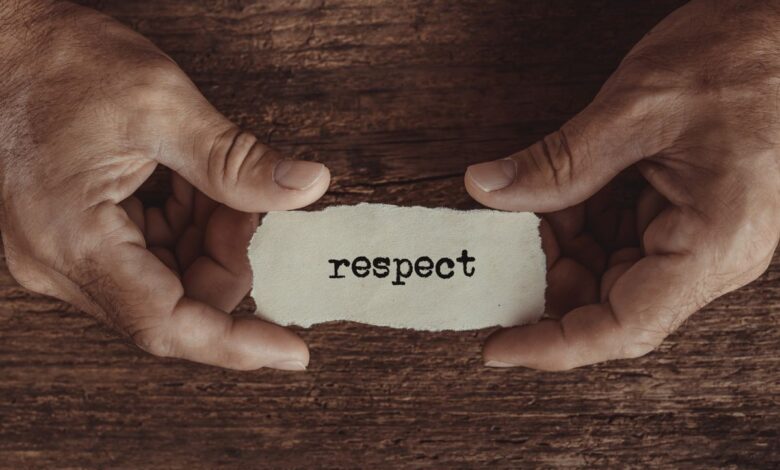Embracing Self Respect: A Comprehensive Guide to Benefits, Development, and Cultivation

Self respect is something we all want, yet it can be hard to achieve. It’s an essential part of our identity and happiness that enables us to feel confident in ourselves and content with life. But what exactly is self-respect? And how do you go about cultivating it? In this article, we will explore the meaning of self-respect and offer tips on ways to boost your own sense of self-worth.
At its core, self-respect is a recognition and appreciation for oneself; understanding one’s strengths as well as weaknesses, being honest with yourself, taking responsibility for your actions and living up to your values and beliefs – no matter what society or other people expect from you. Self-respect helps us make decisions in alignment with our personal needs and goals rather than those imposed by external forces or expectations. When we practice self-respect, not only are we more likely to reach our full potential but also become better equipped to handle challenges that come our way.
Cultivating self-respect can take time and effort however there are many simple steps that can help us get started on the path toward increased inner confidence. We invite you to read on for advice on building healthy levels of self-esteem through developing positive habits such as practising gratitude, setting realistic expectations for ourselves, and treating ourselves kindly.
Self Respect
Self-respect is an invaluable commodity; one that all of us should strive to achieve. Like the Holy Grail, self-respect is a quest that we must embark upon with enthusiasm and vigor if we are to find success in our endeavors. In this modern age, it has become increasingly difficult to nurture and maintain such qualities as humility and empathy – no longer do these virtues appear so de rigueur. Nevertheless, when achieved, self-respect can bring forth myriad benefits both tangible and intangible alike.
One of the most important aspects of cultivating self-respect is learning how to take responsibility for ourselves and our actions without passing blame onto others. When we make mistakes or experience setbacks in life, being able to confront failure head-on rather than trying to absolve oneself is essential if we’re going to have any hope at achieving true inner peace and contentment. This means accepting responsibility even in moments where you might be tempted to place fault elsewhere, allowing yourself time to reflect on your decisions whilst taking solace from your own strength of character.
By embracing the idea of self-worth through resilience and understanding what areas need improvement, we can slowly build up a sense of confidence within ourselves which will help shape future decisions more effectively – something many people struggle with due their lack of appreciation for themselves as individuals. Through recognizing your potential as well as respecting other’s opinions but ultimately formulating judgement independently, you can begin creating a clearer picture for yourself that doesn’t rely solely on external reactions or acceptance.
Achieving true self-respect requires dedication and determination yet reaps rewards far greater than those seen during its acquisition phase – not only does having high esteem allow us freedom over our choices but it also helps develop healthier relationships with those around us too! By understanding who you are at heart without relying on outside validation or manipulation techniques, you leave room open for genuine connections that don’t depend on outcomes or expectations set by anyone else but yourself. And while it may seem daunting initially, discovering the full extent of what lies beneath the surface offers immense gratification once explored thoroughly enough…the benefits of self respect truly speak volumes!
The Benefits Of Self Respect
It’s a funny thing, self-respect. It’s like an old friend that you never really knew well but can’t seem to shake off. You can feel it lurking in the corners of your life and yet, we often don’t give it much thought or attention. We all want more self-respect, after all it brings many benefits – from increased confidence to better relationships with others – so why not take the time to learn how to develop and demonstrate it?
First up, let us consider what exactly self-respect is: while some might think of it as simple vanity (which is totally understandable), this isn’t quite right; true self-respect involves valuing ourselves for our accomplishments and character traits without overinflating them out of proportion. This means accepting both our strengths and weaknesses – celebrating successes but also learning from mistakes – which requires a healthy level of humility too.
A second important point is that having self-respect doesn’t mean expecting perfection from oneself – no one should be striving for such unrealistic goals! Instead, it’s about holding yourself to reasonable standards and understanding that sometimes things won’t go according to plan (and being okay with that). That way, when things do work out, you get to bask in the sense of accomplishment rather than feeling overwhelmed by high expectations.
So if someone were looking for ways to increase their own self-esteem then they’d hopefully have realized by now that it comes down to fostering a balanced mindset towards themselves: recognizing their worthiness whilst still allowing room for growth. From hereon lies the journey – one full of progress and personal development.and ultimately, the satisfaction of reaching one’s full potential.
Ways To Develop And Demonstrate Self Respect
We all strive to have self-respect–to be proud of our accomplishments and feel secure in who we are as individuals. To do this, it is important that we take steps to develop ourselves, embrace our strengths, and demonstrate our worthiness. In learning how to cultivate a healthy sense of self-respect, one must understand the importance of its power!
Our level of self-respect can make or break us: if it’s too low, we may find ourselves feeling insecure or downplaying our successes; conversely, if it’s too high, it could lead to arrogance and an inability to accept criticism. Therefore, finding balance between these two extremes is essential for maintaining mental health and well-being.
One way to start developing your own sense of self-respect is by taking time out for yourself – setting aside moments each day where you focus on your wants and needs. Additionally, nurturing relationships with people who cherish and honor you will help build up both your confidence and esteem. Regularly practicing gratitude can also aid in developing feelings of appreciation towards oneself – appreciating small victories helps boost morale and increases overall happiness.
By understanding what behaviors foster healthy respect for oneself – such as speaking kindly about yourself and refraining from comparing yourself to others – you can achieve greater fulfillment in life while positively impacting those around you. This journey begins with investing in yourself through contemplation, reflection, compassion…and ultimately believing that you are worthy enough to love without conditions attached!
Building Healthy Self Respect
Developing healthy self respect is an important step towards overall wellbeing. Achieving this can be done through different activities that build confidence and a positive outlook on the world. It’s all about finding out what works for you, and making sure to take time for yourself in order to cultivate it.
One of the ways to start building self respect is by setting goals for yourself and taking steps towards achieving them. This could include anything from big career or educational ambitions, or smaller daily tasks like cleaning your room or exercising more often. You’ll also want to think about how these goals fit into your values system so you’re able to stay focused on long-term objectives with greater clarity of purpose. Taking pride in completing difficult tasks will help boost your sense of accomplishment and worthiness over time.
Another way to foster good self esteem is by surrounding yourself with people who are supportive and encouraging rather than judgmental or dismissive of your feelings. Whether they come in the form of friends, family members, colleagues at work, or other acquaintances – relationships built upon mutual trust and understanding can go a long way when it comes to improving our own belief systems. Being around those who make us feel respected contributes positively to our mindset as we strive toward personal growth.
When combined together, goal setting and fostering supportive relationships create an environment where one can reach their full potential without fear of failure or criticism from outside sources. As such, forming these habits helps us become more independent while still allowing for collaboration with others when needed; creating balance between internal motivation and external support which leads to better decision-making capabilities down the line. With these tools under our belt, we have everything necessary in hand to move forwards confidently on our path toward cultivating self-respect through positive thinking.
Cultivating Self-Respect Through Positive Thinking
Self-respect is a necessary component of any successful and fulfilling life. It can be thought of as the foundation upon which our sense of self-worth, confidence, and resilience rests. Cultivating this important trait through positive thinking helps us to develop into healthy adults with strong emotional intelligence.
Analogously speaking, it’s almost like constructing a house: we must lay down the building blocks first before we can begin adding on extra features such as decorations or furniture. Positive thinking serves as an invaluable tool in strengthening these foundational elements; allowing us to build up from there in order to shape who we are today and tomorrow.
For instance, by recognizing our successes rather than dwelling on failures, we foster a healthier relationship with ourselves that furthers our overall well-being; meanwhile, replacing negative thoughts with more uplifting ones encourages us to take risks and engage in meaningful activities without fear of judgment or rejection. Ultimately, taking control of one’s internal dialogue leads to greater satisfaction both within oneself and outwardly in relationships with others.
Reinforcing self-respect through intentional positivity allows us to lead dignified lives full of personal fulfillment and success—now let’s look at how social media influences all this.
The Impact Of Social Media On Self Respect
The impact of social media on self-respect is a pervasive issue that affects millions of individuals. Nearly 4 in 10 U.S adults get news from social media, according to the Pew Research Center1, indicating how much influence these platforms have over our lives and perceptions. We’ll explore why this is concerning when it comes to developing healthy self-respect and what we can do to stay true to ourselves.
To start off with, let’s take a look at the top three ways that social media negatively impacts an individual’s self-respect:
- Unhealthy comparisons – Constantly comparing our lives with others’ perceived realities creates unrealistic expectations for ourselves, leading us to feel inadequate or like failures;
- Fostering superficial values – Social media often rewards those who prioritize their appearance or status above all else, resulting in users feeling pressure to conform;
- Creating echo chambers – People tend to surround themselves with people whose beliefs are similar to theirs online — which reinforces any negative thoughts they may have about themselves by only hearing one side of the story.
These issues lead many people into questioning their worth and value as individuals, making it more difficult for them to develop strong feelings of self-respect. To combat this trend, we need strategies that keep us grounded in reality and allow us to focus on ourselves without external validation from social media.
One way we can do this is by consciously following accounts that promote positive messages and bring out our best qualities rather than ones that make us feel worse about ourselves. Additionally, reducing screen time will help limit exposure to damaging content while also allowing us more time for activities that build confidence and resilience. Lastly, talking openly with friends and family members about struggles related to self-esteem helps create support networks such as mental health professionals if needed.
By taking proactive steps like these now, we can ensure that we remain authentic in who we are while cultivating healthier levels of self-respect down the road.
Staying True To Yourself And Developing Self Respect
Staying true to yourself and developing self-respect can be a difficult process. It takes effort, dedication, and commitment to not just accept who you are but also love it. Self-respect is an important aspect of our mental health as it allows us to take pride in ourselves and make decisions that reflect our true values.
We must learn how to distinguish between the need for approval from others and staying honest with ourselves. We may receive praise or compliments from those around us, yet we must always remember that any opinion other than our own does not define us or our worthiness. Moreover, striving for perfection will only lead to disappointment because no one is perfect; instead, we should focus on being kind to ourselves by recognizing our strengths and weaknesses without judgment.
Building up confidence starts within ourselves when we start treating ourselves with kindness by accepting every part of who we are – successes, mistakes, flaws included – understanding what makes us unique, being grateful for all experiences both positive and negative, setting realistic goals for personal growth and development, practicing positive affirmations each day such as “I am worthy” or “I have value” etc., pushing through obstacles rather than giving up despite failure or defeat.
By committing time towards nourishing self-respect, we understand that there is power in loving oneself wholly; this then leads us into understanding the difference between self-esteem and self-respect.
Understanding The Difference Between Self Esteem And Self Respect
Imagine a mountain, its peak shrouded in clouds. At the base of this mountain lay two paths – one leading to self-esteem and the other to self-respect. While they appear similar on the surface, these separate paths reveal distinct values that define each individual goal. Understanding the difference between self-esteem and self-respect is essential for staying true to oneself and developing personal respect.
Self-esteem refers to how we value ourselves internally; it’s an evaluation of our abilities, appearance, emotions, and thoughts. This internal process can be influenced by outside sources such as friends or media outlets but ultimately boils down to what we decide about ourselves. On the other hand, self-respect is rooted in external validation from others; it’s a reflection of how much regard we have for ourselves based on social norms and standards.
Though both are important aspects of mental health, there lies a key distinction between them: while esteem focuses more on accepting yourself with all your flaws and mistakes, respect involves respecting the rights of others even when you disagree with their opinions or beliefs. Consequently, someone who has high levels of esteem may still lack basic respect towards themselves due to not recognizing the importance of interpersonal interactions in validating identity.
The next step then is learning how to develop both types of respect within children so that they can recognize their worth without relying solely on external opinion or judgment.
Developing Self-Respect In Children
Developing self-respect in children is an essential part of their growth and development. It’s important for them to learn how to value themselves, have confidence, and make healthy decisions that will help shape their future. Here are three key strategies parents can use to foster a sense of self-respect in their kids:
- 1) Model Respectful Behavior: The most influential way parents can teach their children about respecting themselves is by modeling respectful behavior. Show your child what it looks like when you treat yourself with dignity and demonstrate the same kindness towards others.
- 2) Encourage Genuine Accomplishment: Help your child recognize accomplishments they achieve through hard work instead of praising them just for existing or doing something easy. For example, if they get a good grade on a difficult test, acknowledge their success without downplaying it as ‘no big deal’. Make sure they know that if they put effort into something, it pays off.
- 3) Support Their Interests: Let your child know that pursuing activities they enjoy is okay and should be encouraged. If there’s something special they want to do but may need assistance with accomplishing it, offer guidance while allowing them the freedom to explore independently.
By providing these forms of support early on, kids will grow up feeling secure in who they are and develop strong self-respect over time. With this foundation established, children can continue to build upon it throughout life—overcoming any low self-esteem issues along the way.
Overcoming Low Self Respect
Having low self-respect can be a difficult thing to overcome. It’s easy to get caught in the negative cycle of feeling worthless or undeserving, and this can have a lasting impact on our lives. To break out of this mire of negativity takes dedication, effort, and time.
The first step is to recognize that we deserve respect from ourselves just as much as anyone else does. We must learn how to forgive ourselves for past mistakes and focus instead on positive thinking about who we are and what we can achieve. This means replacing old patterns of negative self-talk with affirmation, and understanding our worthiness without comparing ourselves unfavorably to others around us. Once we begin repeating these new thoughts each day, it will become easier to accept them into our hearts and minds.
Making small changes in our behavior can also help build up our sense of self-respect over time. Shifting away from activities that make us feel bad towards ones that lift us up – whether it be taking an art class or going for walks in nature – helps increase our confidence in our own abilities while reinforcing the idea that we matter enough to take care of ourselves. Having friends and family members who support us through these changes can provide additional encouragement on the path towards greater inner strength and self-esteem.
With awareness, practice, and support, overcoming low self-respect becomes possible; allowing individuals to create a healthier relationship with themselves which then creates a ripple effect throughout their other relationships too.
The Role Of Self Respect In Relationships
When it comes to relationships, self-respect plays an important role. Without a healthy level of self-respect, individuals are unlikely to enter into secure and successful partnerships with another person. This is because low self-esteem can lead to feelings of insecurity, as well as the tendency to engage in behaviors that may cause harm or conflict within the relationship.
For example, if someone has poor self-esteem they may be more likely to become jealous over their partner’s activities or interactions with others. They might also put themselves down frequently when communicating with their partner, which could result in arguments and damage trust between them. In addition, those who lack confidence in themselves tend to be overly dependent on their partners for validation and approval.
It’s essential for people to cultivate good levels of self-respect before entering into any form of romantic partnership so that both parties receive the support and respect they deserve from one another. Having a strong sense of worthiness allows us to show up fully in our relationships without fear or doubt about ourselves or our partners. It enables us to communicate honestly and openly by expressing our needs clearly while still being open to hearing other perspectives and suggestions. Establishing these kinds of foundations helps ensure that the relationship will remain stable even during difficult times.
Achieving this kind of balance requires work but is possible when we recognize how powerful having healthy levels of self-respect can be in creating meaningful connections with others. With this knowledge, we can begin taking steps towards developing healthier attitudes towards ourselves and engaging in positive behavior that reflects our true values rather than damaging ones rooted in insecurity or mental health issues.
Self Respect And Mental Health
Research shows that self-respect is a key factor in mental health and well-being. A study conducted by American Psychological Association found that people who have a strong sense of self-worth tend to be less likely to experience depression or other forms of psychological distress. This suggests that having healthy levels of self-respect can help promote overall mental health and balance, as well as provide protection against emotions like guilt, shame and anxiety.
Having an appropriate level of self-respect also provides us with the ability to value ourselves, which helps us build trust both within our relationships and ourselves. When we feel valued, it encourages us to make decisions from our own perspective instead of someone else’s – something essential for developing personal autonomy. Additionally, valuing oneself has been linked to improved communication skills with others; if you are able to express yourself clearly without feeling guilty or ashamed about your thoughts or beliefs then you’re more likely to create meaningful connections with those around you.
Self-respect is also closely intertwined with self-esteem – how we view ourselves on a deeper level than just outward appearance. People who have higher levels of self-esteem are usually better equipped at managing their feelings while engaging in difficult conversations such as saying ‘no’ when they need to set boundaries. They are also often more confident in making important life decisions because they know they can trust their judgement and opinions, regardless of what others may think or say.
In order to ensure good mental health and well-being, it’s important that we take the necessary steps towards cultivating a positive view of ourselves so that we can show up authentically in our relationships and experiences. Taking time out for yourself every now and again is one way to practice this type of self-care – allowing yourself moments away from work or other obligations where you can relax, reflect on your values and appreciate your unique gifts will all contribute towards building an attitude of self-acceptance over time. From here, setting boundaries becomes easier as does respecting yourself even through challenging times.
How To Set Boundaries And Respect Yourself
The path towards self-respect begins with establishing healthy boundaries. To do this, we must first recognize what kind of behavior is acceptable and unacceptable in our lives. We can start by closing the door to anything that might be toxic or harmful to us – both physically and emotionally. Imagine your life as a castle surrounded by strong walls. Those walls protect you from any negative influences that may try to enter your space without permission.
Once those boundaries have been set, it’s important to stand firm on them. It’s easy to allow others to take advantage of us if we aren’t sure how far they can push before we put our foot down. But it doesn’t have to be done harshly; instead, communication should be used as a tool for maintaining respect in relationships. Be honest about what makes you feel comfortable and stick up for yourself when needed; don’t let anyone make decisions for you or dictate how you should live your life.
One way to ensure these boundaries are upheld is through cultivating an attitude of self-love and appreciation for who you are at all times – flaws included! Acknowledge and celebrate personal victories no matter how small, reward yourself for making difficult but necessary choices, and never forget that only YOU know best when it comes to taking care of yourself. These positive reinforcement techniques will help build a strong foundation of self-respect which will enable us to navigate through challenging situations with confidence and poise.
As such, having a sense of purpose plays an integral role in fostering true contentment within ourselves – something that goes beyond shallow validation from external sources.
The Role Of Religion And Spirituality In Self Respect
The role of religion and spirituality in self-respect is a complex topic, one that has been explored for centuries. After all, faith can be seen as the foundation of morality – so it stands to reason that having strong spiritual beliefs could lead to greater feelings of self-worth. Irony lies in how difficult it can be to find true meaning within traditional religious teachings when it comes to respecting oneself; instead, many are taught to focus on humility without understanding the power of internal validation.
However, while religious instruction often fails to emphasize personal autonomy and agency, there is still potential found in faith-based communities and practices. In many religions, meditation or prayer offer an opportunity for individuals to connect with their innermost thoughts and emotions – allowing them to discern which values they hold most dear and what actions will bring them closer towards honoring themselves. During these moments of introspection, people may come away with a better sense of appreciation for who they are and what makes them unique.
Furthermore, connecting with others through shared spiritual experiences also has its benefits when it comes to building up self-esteem. By participating in communal ceremonies or joining groups dedicated towards exploring deeper truths about life together, people have the opportunity to draw from each other’s strength and gain insight into different perspectives – broadening their worldviews along the way. With this newfound perspective can come fresh ideas about how best we should treat ourselves. Without ever uttering ‘In conclusion’ or ‘Finally’, our journey takes us next towards exploring the power of self-respect.
The Power Of Self Respect
Self-respect is an invaluable asset that cannot be overstated! It’s more than a feeling; it’s the basis of our own self-worth and confidence. Self-respect allows us to stand tall, to look in the mirror and accept ourselves for who we are. Without this powerful sense of admiration, life would feel empty and meaningless.
The power of self-respect can transcend all other forms of respect from others – if we are able to truly love ourselves, then external validation will pale in comparison. Ultimately, when it comes down to the core essence of our being, trusting in oneself is the most important thing one can do. We must learn how to forgive ourselves for any mistakes or missteps we make along our journey through life. We must never give up on striving towards becoming better versions of ourselves because with enough dedication and hard work, anything is possible!
But as much as self-respect is a strength that helps keep us going during difficult times, it also has its pitfalls. Pride can easily lead to arrogance, which may eventually cause us to drift away from those around us and become isolated. As such, it’s essential that we maintain balance between believing in ourselves while not letting our egos take control and cloud our judgement. With the right amount of humility mixed into your attitude you’ll be well on your way to embracing true self-respect without crossing into dangerous territory.
In short: it takes practice but cultivating positive thoughts about yourself will ultimately pay off by helping you reach heights beyond what you ever imagined possible!
Conclusion
It is important to understand the difference between self-esteem and self-respect. Self-esteem refers to how we feel about ourselves, while self-respect is something that comes from within and cannot be taken away. It’s a deep sense of worthiness and knowing your own value.
When it comes to mastering the art of self-respect, you must be willing to take risks and stand up for yourself even when others don’t agree with you. Don’t let anyone else define who you are or what you should do; instead, trust your instincts and have faith in yourself. I like to think of having self-respect as taking ownership of my life and not letting anyone else “call the shots” – this gives me control over my destiny and puts me firmly on the path toward success. After all, they say “you can only reach your full potential if you believe in yourself.” Having self-respect means that I am the only one responsible for my own life, and I am the one who chooses the direction I want to take.




